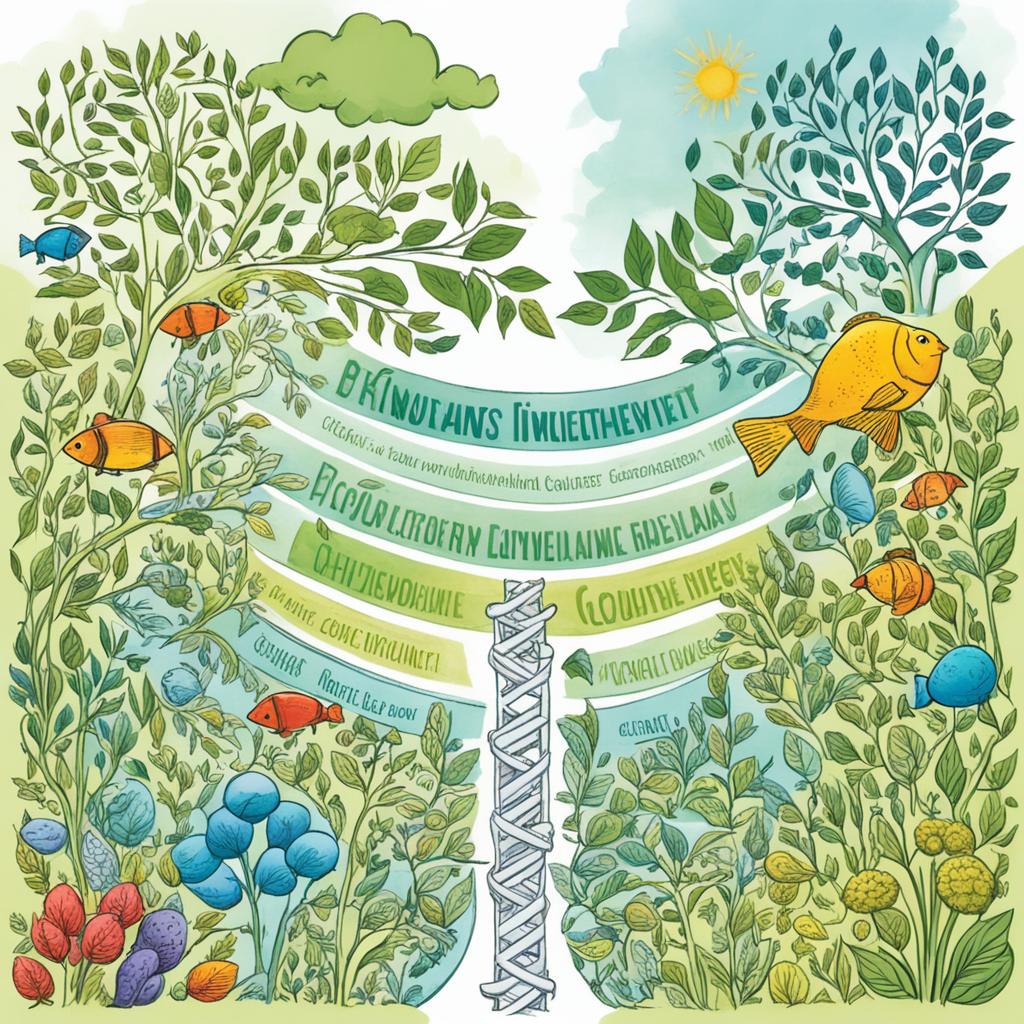Did you know that our genes and environment both play a significant role in shaping who we are? The age-old debate between nature and nurture has fascinated scientists, psychologists, and philosophers for centuries. While some believe that our genetic makeup determines our traits and behavior, others argue that our environment and experiences are the primary influences. So, where does the truth lie?
In this article, we will delve into the intricate relationship between genetics and the environment, exploring how these factors interact to shape human development. Join us as we explore compelling case studies, unravel the complexities of gene-environment interactions, and discuss the implications for personal development, education, and mental health.
Understanding Genetics
Genetics is a fascinating field that holds the key to unlocking the mysteries of our physical and behavioral traits. By examining the role of DNA, genes, and hereditary factors, we can gain insights into the intricate workings of our nature.
At the core of our genetic makeup lies our DNA, the blueprint that guides the development and functioning of our bodies. Within this double-helix structure are genes, the units of heredity that carry the instructions for specific traits. These genes determine everything from our eye color to our susceptibility to certain diseases.
Researchers have long been intrigued by the nature vs. nurture debate, which explores the relative contributions of genetics and the environment in shaping who we are. While genetics provides the foundation, it is important to recognize that it does not solely determine our destiny. The interplay between nature and nurture is complex and multifaceted.
“Genetics loads the gun, but environment pulls the trigger.” – Dr. Charles R. Figley
As Dr. Figley’s quote suggests, genetics sets the stage, but environmental factors play a crucial role in determining how those genetic predispositions manifest in our lives. The environment, including our upbringing, culture, social interactions, and experiences, can shape our behavior, personality, and even cognitive abilities.
It is essential to understand that genetics is not a static concept but rather a dynamic process influenced by both internal and external factors. Epigenetics, for instance, studies how gene expression can be modified by environmental cues, such as diet, stress, and exposure to toxins.
“Epigenetics is proving we have some responsibility for the integrity of our genome.” – Dr. Ken Resnicow
The study of genetics has opened up new avenues of exploration, offering insights into the interconnectedness of our nature and nurture. By understanding the complex interplay between genetics and the environment, we can gain a deeper appreciation for the factors that shape our identities and behaviors.
Next, we will shift our focus to the power of the environment and its impact on human development.
The Power of Environment
While genetics plays a significant role in shaping who we are, the environment we grow up in and the experiences we have also have a profound impact on our development. The power of the environment cannot be underestimated when considering the nature vs. nurture debate.
Our upbringing, which includes our family dynamics, socioeconomic status, and access to education and resources, lays the foundation for our beliefs, values, and behavior. For example, a child raised in a nurturing and supportive environment may develop confidence, empathy, and strong social skills, while a child exposed to neglect or abuse may struggle with trust and emotional regulation.
“The environment acts as a sculptor, continuously shaping and molding our personalities, preferences, and tendencies.” – Dr. Sarah Johnson, Developmental Psychologist
Culture also plays a major role in influencing our behavior and shaping our identities. The beliefs, traditions, and values upheld within a particular culture significantly impact how individuals think, communicate, and interact with others. For instance, individuals from collectivist cultures may prioritize group harmony and conformity, while individuals from individualistic cultures may prioritize personal autonomy and independence.
Furthermore, our social interactions with peers, friends, and coworkers contribute to our development. These interactions provide opportunities for learning, socialization, and the acquisition of social skills. The relationships we form and the support we receive from others greatly influence our emotional well-being and overall happiness.
Our experiences, both positive and negative, further shape our behavior and personality. Whether it’s traveling to new places, overcoming challenges, or experiencing trauma, these experiences contribute to our growth and development. They shape our perspectives, resilience, and ability to adapt to different situations.


Recognizing the impact of the environment is crucial in understanding human development. It highlights the importance of creating nurturing environments at home, in educational settings, and in society as a whole. By providing individuals with positive experiences, supportive relationships, and equal opportunities, we can foster healthy and thriving individuals who contribute positively to their communities.
Next, we explore the arguments from both sides of the nature vs. nurture debate to gain a comprehensive understanding of how genetics and the environment interact to shape our traits and behavior.
Nature vs. Nurture: Two Sides of the Coin
The nature vs. nurture debate has long been a topic of fascination and controversy within the field of psychology. It centers around the question of whether our genetics or our environment have a greater influence on our traits and behavior. This age-old debate presents two distinct sides, each with compelling arguments that contribute to our understanding of human development.
Genetics: Unveiling the Blueprint
Proponents of the genetic perspective argue that our DNA and genetic makeup play a fundamental role in shaping who we are. Genes are the building blocks of life, containing instructions for the development of our physical attributes and predispositions to certain behaviors. They provide us with inherited traits and characteristics that can be traced back through generations.
“Genes load the gun, but the environment pulls the trigger.”
According to this viewpoint, individual differences stem from variations in genetic code rather than environmental factors. These differences can manifest as variations in height, intelligence, temperament, and even susceptibility to certain diseases. Proponents of the genetic argument emphasize the significance of heredity in shaping our innate qualities and predispositions.
The Environment: A Crucial Nurturer
On the other side of the debate, proponents of the environmental perspective emphasize the crucial role that the environment plays in shaping human behavior and development. They argue that our upbringing, cultural influences, experiences, and social interactions are powerful determinants of who we become.
The environmental perspective highlights the idea that individuals are shaped by their surroundings, whether it be their family dynamics, educational opportunities, or exposure to diverse cultures. Advocates of this viewpoint assert that even individuals with the same genetic makeup can develop into vastly different individuals based on the environment in which they are raised.
The Complexity of Nature and Nurture Interactions
In reality, the interplay between genetics and the environment is far more intricate and intertwined than a simple dichotomy of nature vs. nurture. Research suggests that both genetic and environmental factors work together, influencing one another in shaping our development.


Genetic predispositions may make individuals more susceptible to certain environmental influences, while the environment can activate or suppress certain genetic traits. It is this intricate dance between nature and nurture that ultimately shapes our individuality, with genetics providing the foundation on which the environment builds.
Thus, the nature vs. nurture debate presents fascinating insights into the relative importance of genetics and the environment in determining our traits and behavior. By understanding the complexity and interconnectedness of these factors, we gain a deeper understanding of what it means to be human, highlighting the unique blend of genetics and environment that makes each individual a truly fascinating and multifaceted being.
The Complexity of Gene-Environment Interactions
When exploring the nature vs. nurture debate, it becomes apparent that genetics and the environment are not separate entities but rather interconnected forces that shape an individual’s development. The interplay between genetics and the environment is a complex and fascinating phenomenon that influences various aspects of our lives.
Genetic predispositions can significantly impact how individuals respond to different environmental factors. An individual may carry genes that make them more susceptible to certain physical conditions or mental health disorders. For example, someone with a family history of diabetes may have a higher risk of developing the condition due to their genetic makeup.
Similarly, environmental factors can also influence genetic expression. The environment we grow up in, the experiences we have, and the social interactions we engage in can all impact how our genes function. Research has shown that environmental factors can play a role in the activation or suppression of certain genes, affecting traits and behaviors.
The complex interaction between genetics and the environment is best illustrated through examples like epigenetics. Epigenetic mechanisms involve modifications to gene expression that occur without altering the underlying DNA sequence. These modifications can be influenced by environmental factors, such as stress or nutrition, and can have long-lasting impacts on an individual’s health and well-being.
“The interaction between genetics and the environment is not a one-way street. It is a dynamic and reciprocal relationship where both nature and nurture continually shape and influence each other.”
Understanding the intricate nature of gene-environment interactions has significant implications for fields such as personalized medicine and psychology. By recognizing the role both genetics and the environment play in shaping our lives, we can develop targeted interventions and treatments that take into account individual differences and tailor them to specific needs.


Case Studies and Twin Studies
In the ongoing nature vs. nurture debate, case studies and twin studies have played a pivotal role in unraveling the complex interplay between genetics and the environment. These studies have provided valuable insights into how nature and nurture contribute to the development of human traits and behavior.
Case studies involve in-depth examinations of individuals or small groups, focusing on specific genetic or environmental factors that may have influenced their lives. By studying the unique experiences and backgrounds of these individuals, researchers can gain a deeper understanding of how genetics and the environment interact to shape human development.
For example, the famous case study of Genie, a young girl who was kept isolated and deprived of social interaction during her early childhood, shed light on the critical role of the environment in language acquisition. Despite having a genetic predisposition for language development, Genie was unable to acquire language skills due to her deprived upbringing. This case study highlighted the importance of nurturing and stimulating environments for cognitive development.
Twin studies, on the other hand, involve comparing the similarities and differences between identical twins, who share 100% of their genetic material, and fraternal twins, who share only 50% of their genetic material. By comparing these two types of twins, researchers can tease apart the influences of nature and nurture on various traits and behaviors.
Through twin studies, researchers have discovered fascinating insights. For example, twin studies have revealed that genetic factors play a significant role in certain aspects of personality, such as extraversion and neuroticism. However, environmental factors also have a substantial impact on personality development, as evidenced by the differences observed between identical twins raised in different environments.


These case studies and twin studies provide valuable evidence for the complex interaction between genetics and the environment. They demonstrate that both nature and nurture contribute to the formation of human traits and behaviors. Understanding the relative contributions of genetics and the environment is crucial for gaining insights into individual differences and informing approaches to personal development, education, and mental health.
Implications for Personal Development and Education
Understanding the intricate interplay between genetics and the environment has profound implications for personal development and education. By recognizing the role of genetics, parents and educators can adopt strategies that align with a child’s innate predispositions and strengths. Additionally, understanding the impact of the environment allows for intentional shaping of a child’s upbringing to foster positive outcomes.
Genetics plays a significant role in determining an individual’s talents, interests, and cognitive abilities. By identifying inherent strengths through genetic testing and analysis, parents can provide tailored guidance and opportunities that align with their child’s unique genetic profile. For example, if a child displays an aptitude for music through genetic markers, parents may choose to prioritize music lessons or involvement in a school band.
Conversely, the environment plays a crucial role in shaping behavior, values, and social skills. Through nurturing and supportive environments, children can develop resilience, empathy, and emotional intelligence. By exposing children to diverse cultures, experiences, and perspectives, parents and educators can broaden their understanding of the world and cultivate open-mindedness.
It is also important to acknowledge that the nature vs. nurture debate does not imply that genetics or the environment solely determines a person’s outcomes. Instead, it highlights the need to consider both factors in a holistic approach to personal development and education. By recognizing the interactions between genetics and the environment, parents and educators can create nurturing environments that support and enhance a child’s genetic potential.
“Genetics load the gun, but the environment pulls the trigger.” – Dr. Bruce Perry
Dr. Bruce Perry’s quote encapsulates the profound impact of both genetics and the environment on human development. It emphasizes the intricate relationship between nature and nurture, highlighting the need to consider both factors when shaping personal development and educational strategies.
Parenting Strategies
- Recognize and nurture a child’s innate strengths and talents.
- Provide opportunities for growth and development that align with genetic predispositions.
- Create a supportive and nurturing environment that encourages exploration and personal growth.
- Develop a balanced and holistic approach to parenting that considers both genetics and the environment.
Educational Approaches
- Design educational programs that take into account individual genetic variations and learning styles.
- Promote a diverse and inclusive learning environment that exposes children to different cultures, perspectives, and ideas.
- Encourage hands-on and experiential learning to engage and stimulate cognitive development.
- Provide additional support and resources for children who may require extra assistance due to genetic or environmental factors.
By recognizing the interplay between genetics and the environment, parents and educators can optimize personal development and education for each individual, taking into account their unique genetic makeup and the impact of their surroundings. This approach allows for a more personalized and effective approach to nurturing and facilitating growth, ultimately setting individuals up for success in all aspects of life.
Now, let’s delve into the ethical considerations and policy implications surrounding the nature vs. nurture debate.
Ethical Considerations and Policy Implications
As we delve deeper into the nature vs. nurture debate, it is crucial to address the ethical considerations and policy implications that arise from our understanding of genetics, environment, and their influence on human development. The knowledge we gain from this ongoing discourse has far-reaching implications that extend beyond academic debates and scientific research.
Genetic testing is one area where the nature vs. nurture debate intersects with ethics. The ability to analyze an individual’s DNA can provide valuable insights into their genetic predispositions and potential health risks. However, it raises concerns about privacy, discrimination, and the potential misuse of this information. Striking a balance between accessing knowledge for medical purposes and protecting individual rights remains a challenge.
Discrimination is another significant ethical consideration intertwined with the nature vs. nurture debate. Our understanding of genetics and the environment can potentially lead to unjust discrimination based on an individual’s genetic makeup or socio-environmental factors. Safeguarding against genetic discrimination and ensuring equal opportunities for all individuals becomes imperative.
Educational policies also come into focus when examining the implications of the nature vs. nurture debate. Understanding the influence of genetics and the environment can reshape educational approaches and strategies to cater to the diverse needs of students. Tailoring education to acknowledge individual differences can foster inclusive learning environments and promote the overall development of every learner.
These ethical considerations call for the development of comprehensive policies that strike a delicate balance between scientific advancements and the protection of individual rights and equal opportunities. Regulation and legislation must be informed by the latest research and must prioritize equity, privacy, and ethical standards.
“We must navigate the complex ethical landscape shaped by the nature vs. nurture debate with utmost care, ensuring that our policies protect individual rights, promote equality, and facilitate scientific advancements.” – Dr. Emma Greenfield, Ethical Consultant
The intersection of genetics, environment, and ethics is a crucial area of exploration within the ongoing nature vs. nurture debate. It challenges us to confront the potential consequences of our newfound knowledge while striving to create a fair and inclusive society that values both individuality and equality.


Nature, Nurture, and Mental Health
The nature vs. nurture debate extends beyond physical and behavioral traits to encompass an essential aspect of human well-being: mental health. Understanding the interplay between genetics and the environment is crucial in comprehending the development of mental disorders and designing effective treatment approaches.
Genetic factors play a significant role in determining an individual’s susceptibility to mental health conditions. Research has identified specific genes that contribute to disorders such as depression, anxiety, schizophrenia, and bipolar disorder. These genetic predispositions can increase the risk of developing these conditions, highlighting the influence of genetics on mental health.
However, genes alone do not determine mental health outcomes. Environmental factors also contribute significantly. Adverse childhood experiences, such as trauma, abuse, or neglect, can have lasting effects on mental well-being. Similarly, socio-economic factors, social support systems, and cultural influences shape an individual’s mental health trajectory. The environment plays a crucial role in triggering genetic predispositions and influencing the manifestation of mental disorders.
“Mental health is influenced by a complex interplay between genetic factors and environmental triggers,” says Dr. Emily Anderson, a renowned psychiatrist.
“Genetic predispositions may create vulnerabilities, but it is the environment that activates and exacerbates these vulnerabilities, leading to the development of mental disorders.”
- Genetics: Genetic testing and research advancements provide valuable insights into the underlying biological mechanisms of mental disorders. Identifying specific genes associated with certain conditions can help in the development of targeted treatments and personalized interventions.
- Environment: Understanding the environmental factors that contribute to mental health conditions is vital for prevention and intervention strategies. Creating supportive environments, promoting resilience, and providing appropriate therapies can mitigate the impact of adverse experiences.
- Interaction: The interaction between genetics and the environment is intricate and dynamic. Some genetic variants may only lead to mental disorders in the presence of specific environmental triggers. Recognizing these gene-environment interactions can guide treatment decisions and improve outcomes.
It is essential to adopt a holistic approach that considers both genetics and the environment when addressing mental health. Integrating this understanding into clinical practice can lead to more comprehensive assessments, personalized treatment plans, and improved outcomes for individuals with mental disorders.
Conclusion
The nature vs. nurture debate has long captivated researchers and thinkers alike, and our exploration of genetics and the environment has shed light on this complex relationship. Throughout this article, we have examined how both genetics and the environment play a vital role in shaping who we are as individuals.
Genetics, with its foundation in DNA and hereditary factors, provides a blueprint that influences our physical and behavioral traits. However, it is the environment that acts as a powerful force in shaping our development. Our upbringing, culture, social interactions, and experiences all leave lasting imprints on our behavior and personality.
It is crucial to recognize that nature and nurture are not opposing forces but are instead two sides of the same coin. The interplay between genetics and the environment is intricate and multifaceted. Genetic predispositions may influence our response to environmental factors, while the environment can modify the expression of our genes.
In conclusion, a balanced perspective that considers both genetics and the environment is essential in understanding human development. It is the delicate interplay between nature and nurture that molds us into the individuals we become. By acknowledging the contributions of both genetics and the environment, we can gain a deeper understanding of ourselves and our potential.
